By Gabriela Silva Ponte
Disclaimer: Questions and answers have been edited for length and clarity
Toronto Metropolitan University (TMU) held another democracy forum on Oct. 25—this time with Toronto mayor Olivia Chow.
The forum was hosted by The Dais—“an action-oriented public policy and leadership think tank at TMU”—at the George Vari Engineering and Computing Centre’s Sears Atrium.
Martin Regg Cohn, a Toronto Star columnist, moderated the discussion, asking both his own questions and questions from the audience.
TMU president Mohamed Lachemi gave his opening remarks about the event prior to its start.
“As the mayor knows, TMU is a city-builder, central to our vision is advancing dialogue and action around safe, inclusive, resilient and sustainable cities,” Lachemi said. “We are committed to sharing our expertise in areas such as migration, housing, smart infrastructure and land use. We are willing and ready to do more and I think we have the right partner at city hall.” Below is a Q&A style of some of the questions asked and answered.
Regg Cohn: The last time I saw you at the Toronto Star newsroom, during the campaign, you came on your bike. And your team told me there was traffic today so I assume you weren’t able to zip through. But when I saw you last month, you said that your Toronto Police bodyguards, protective service, were having trouble keeping up with you on the bike. Are you having to slow down for them now or how’s it going?
Chow: We’re working on it.
Regg Cohn: What I really hope to learn from today and I think many of the students do as well is how do you do democracy? Before we go to the hard stuff, give us the top lesson that you learned from winning this election.
Chow: When I lost in 2014, there was a big conference there in Halifax. There was a keynote speaker called Marshall Ganz and he said, “Olivia, the best way to learn is through failure.” I said “Pardon me? I just lost the election.” He said, “There’s lots to learn, come down, we’ll teach you a few things.” I went and learned about how winning the argument, which is what we often want to do, is not the be all and end all. Winning the hearts and minds of people is. Winning the minds is not enough, you need to win the hearts. How do you win the hearts? By connecting, by telling your own story. What is the story that brings us together, what is the core value that connects us and how do I fit into that? I learned that public narrative lesson and applied it to the election and low and behold, I was able to win.
Regg Cohn: Let’s talk about Doug Ford and how he talked about you, then and even more recently. A few quotes: “If Olivia Chow gets in, it will be an unmitigated disaster” and “Toronto will be toast if Olivia Chow becomes the lefty mayor.” Strong language in public, very personal, what’s he like in private with you?
Chow: There is something that connects us, no matter who we are as human beings. This is what humanity is about. The hard part is finding out what is that core value that connects us and it’s the power of empathy. Can I understand your pain, your joy, where you’re coming from? And when you have that empathy, you then have the power to connect. Doug Ford lost a loved one—his brother—I lost a loved one—my late husband. We were both city councillors. How is it that we can connect based on that experience of being city councillor and how do we connect as someone that has grieved a loss? If I just go and debate from the logical point of view, Doug Ford and I are very different, it’s not going to get very far. But if we can turn the opinions into an experience, then we can work together. We both experience traffic jams, we need to do something. His solutions might be slightly different than mine, but if I say “Then we both agree that we need better Toronto Transit Commission service, right Premier?” And he’s going to say “Well yeah, we need better public transit.”
Regg Cohn: Tell us what you are going to agree to with Doug Ford?
Chow: You know, it’s a confidential discussion.
Regg Cohn: But we won’t tell anybody!
Chow: I see someone recording! Good things take time, so wait for it, we’ll have something. But the city’s challenges are well-known. We have a bare minimum of a $1.5 billion budget deficit.
Regg Cohn: Will you stay a new democrat?
Chow: I am a new democrat, going to be a new democrat, might die a new democrat. Hopefully not soon!
Regg Cohn: You’ve had to walk a fine line regarding the Middle East, whether it be online or in your statements as Torontonians on both sides of the divide have been protesting the Hamas massacre, the Israeli retaliation, both of which have killed thousands of civilians. Two weeks ago, you posted a tweet, then you had to take it down. You posted another tweet, took it down. Posted a third tweet to clarify and you were getting it from all sides as a consequence. How do you keep Toronto and Torontonians together when emotions are so high when the Middle East is coming apart?
Chow: The power of empathy. If we can grieve together all the civillians that have died, if we can understand the history on both sides and if we could say that anger will always just lead to hate. Anger needs to be transformed into hope. Then we have a choice to make: What is that choice and what action do we take? I’ve made a lot of mistakes in my life and I’ve realized that using social media to express something with this much depth and complexity is really hard. The second tweet was connected to the first tweet, but some people posted them without each other and then it was all muddled. So, I deleted both and put one. And then it was still a bit muddled because it was too short. I put a motion together on hate—on how we could, in this city where we all come together as a beacon of hope globally, where could we deescalate and find hope and stop the hate? So, we now have a motion that passed last week at city council, supported by every member of council, Jewish and Muslim. What other city do we have in the world that has all these diverse people living in harmony?
Regg Cohn: Tell me how you are finding common ground with your councillors on Toronto issues.
Chow: Everyone that runs for office that is elected or is not, is going in because they want to do something, change something, they have a passion to accomplish something, to make their city, their neighbourhood better. So I spent a lot of hours over several weeks to find out each member of council’s passions, what they wanted to accomplish in the next three years, how could I enable them to do that?
The forum then moved into a question period from event attendees.
Audience member: What is the one piece you have to get right in your newly announced housing plan so that it does not become just another housing plan?
Chow: I have people ready to build. I have people ready to move in. I need other levels of government and other partners to believe that it is possible. Because we haven’t built for 25 years and when things are status quo, then it’s easy to say “how is that possible?” It looks like quite a bit of money, but it isn’t, because every time a homeless person ends up in an emergency ward, do you know how expensive that is? Every time a kid has to keep moving from home to home and never be able to find friends because they have to move schools, be a bad student because they’re going to school hungry. We’re losing the taxes that person could pay, my pension is not going to get paid because that person won’t have a good education. The financial impact is steep for us to not take action. Why do we have all these food banks and all these homeless people? It’s a political decision, don’t let them say it isn’t.
Regg Cohn: It’s a big ambitious program. $36 billion over seven years.
Chow: Yeah but it’s only a billion from the federal and provincial government because the rest of it is financing.
Regg Cohn: It’s a big ask from the federal and provincial governments.
Audience member: How can we create comprehensive solutions to problems such as housing that take into account everyone?
Chow: Lived experience matters, because the best road to a bad place is filled with good intentions. The best solution is to actually hear and give the power to the people who have the lived experience and to provide comprehensive programming. Right now a lot of services are fragmented, mental health here, drug treatment here, housing here. You need to integrate it depending on what that person wants or needs because what they need changes, because it’s a journey of recovery, healing and stabilization. What we need is to be here, listen, support, create comprehensive housing where they have a sense of control.
Audience member: Do you have a relationship with the provincial or federal government or how do you plan to build that relationship?
Chow: I am meeting with the provincial ministers. I met on Zoom with federal ministers. I met with Minister of Immigration, Refugees and Citizenship Marc Miller and Minister of Housing, Infrastructures and Communities Sean Fraser and the finance minister face-to-face. I went up to Ottawa and met up with them and some came to Toronto and I met with them. Yesterday was the big city mayor caucus all across Canada with mayors from all the big cities. We had a session with Miller and Fraser, and I also met with the Prime Minister when I first was elected. So yes, we continue to build relationships, but not just one party, I’ve met with other parties, both the Conservatives and the New Democratic Party.
Regg Cohn: What ministers have you met with provincially?
Chow: I plan to meet with the minister of transportation and infrastructure because she controls a lot of money, the minister of housing, and the finance minister where the money lands, and long term care would be great too because we run some long term care homes.
Regg Cohn: How was your meeting with the Deputy Prime Minister Chrystia Freeland who sent you a rather stern letter putting you in your place and telling you how much money Ottawa does send you, for which you should be grateful.
Chow: That’s in the past. We need to build something new, something more hopeful.
Regg Cohn: How did you change the tone with the Deputy Prime Minister?
Chow: She rode her bike, and because we were both cyclists and because we are both not very tall, there is lots to talk about. She lives in the same neighbourhood, I live further south, she lives further north.
Regg Cohn: Do you remember when Jagmeet Singh and Doug Ford met, Jagmeet Singh showed Doug Ford how he rides his bicycle and that’s how they became friends.
Chow: Oh ok, I didn’t know that bicycles could do that, alright.
Regg Cohn: If you had to set aside one of your platforms on the Toronto Transit Commission (TTC) or the homelessness crisis, which would you choose?
Chow: My top priority is housing and the TTC. But they are all connected. If we don’t have good mental health services we aren’t going to be able to build good supportive housing, then people won’t be able to stay in their homes for a long time if they have multiple challenges. I don’t know what I would sacrifice, we do so many things. You need clean water, you need your garbage picked up, you need police, fire departments, and ambulances.
Regg Cohn: Some people say we don’t need to spend as much money on the police, do you think the police budget should be increased significantly or not?
Chow: With the deficit, I have to find some savings somewhere. I don’t know where yet. I need you to join us, starting Nov. 1 we are going to launch the budget. In the past, the budget was done inside city hall, you never saw it until it showed up in January and you were given five minutes to speak to some executive committee and that’s it, you’re gone. But we are turning it around, I am opening it up to say, I need you to tell me what services are most important to increase or decrease.There will be online forms, we will have meetings in the third or fourth week of November. Then, in December, the budget committee will work on the budget and then in January 2024 the budget committee will present something. Then you will get the chance to come to city hall. On Feb. 1, 2024, I will have to put a budget out. When I’m presenting it, it’s already gone through you looking at it, it’s gone through the budget committee. I will be listening and I will be able to tell you what I can sacrifice on Feb. 1 of next year when I present the budget.
Regg Cohn: Any words of inspiration about entering politics?
Chow: If you have a passion to make a difference…to say that “our city government needs me, provincial, federal government needs me, my university needs me, my student union needs me,” I urge you to get involved. But sometimes organizing takes skills. How do you tell your stories? How do you use your stories to motivate your volunteers? How do you work as volunteers so your organization grows because how many of us have organizations that have lots of volunteers and then get smaller and smaller? How do you keep growing your team, your organization? How do you participate politically and be effective so that the government hears you, the people in power hear you, and not just hear you, not just say they hear you, actually do what you want them to do. Those are skills you could learn, and this is a good place to learn it from TMU or other venues.
Regg Cohn told The Eyeopener he was happy with the discussion.
“She really opened up. Not on the detailed answers, she didn’t tell us anything about her secret negotiations with Doug Ford, but for me the takeaway is that she told us how to do democracy,” he said.
“When Olivia Chow got up afterwards and gave her talk, the passion was there and the students were listening, so I think that is how we measure success,” he added. “I hope that we can literally energize people about what democracy is. Voting, yes, but not just voting. Between elections as well. Getting involved, getting engaged and not just tuning out and not just getting frustrated if you don’t get your way.”
Fourth year policy studies PhD student Christian Hui—whose pronouns are he/they;undetectable—said they were disappointed when Regg Cohn cut someone off.
“My feedback has been that [a few racialized individuals] felt like when one [attendee asked] about one tweet, specifically to [Chow] regarding the Free Palestine protest happening on Sunday where some Zionist groups had used the images to frame it as anti-semitism. [Regg Cohn] having a very privileged position and position of power had cut off this person.” Hui said. “I think [Chow’s] response was probably calculated.”
“I think it was very insightful and Olivia is skilled as a former teacher and professor and how to sensitize people on these topics. Basically leaving the job to us, because she can only do so much as an elected official. So after all, they listened, they’re here to serve us, so I thank the organizer for this,” Hui added.
“These are conversations that have to go on, and that’s the heart of politics. Politics is the art of the possible and finding common ground without selling out,” Regg Cohn said.
According to Regg Cohn, this was the 29th democracy forum held at TMU.
Chow was elected to office this June, taking office in mid-July. She is the first racialized person to run city hall in the history of Toronto.

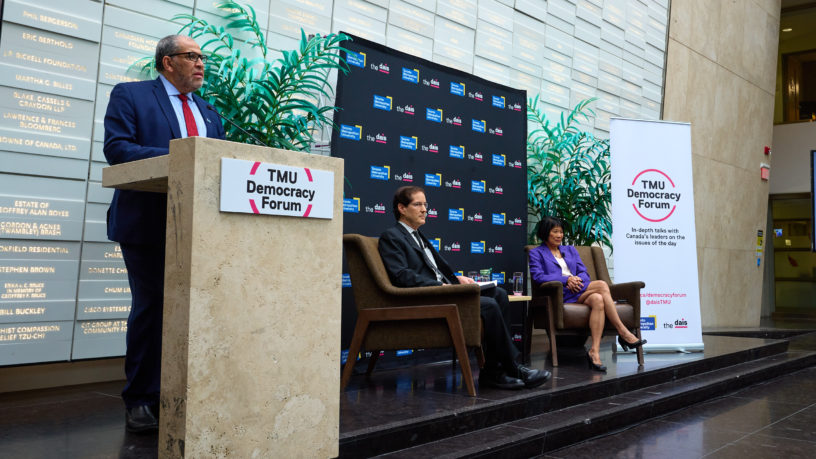
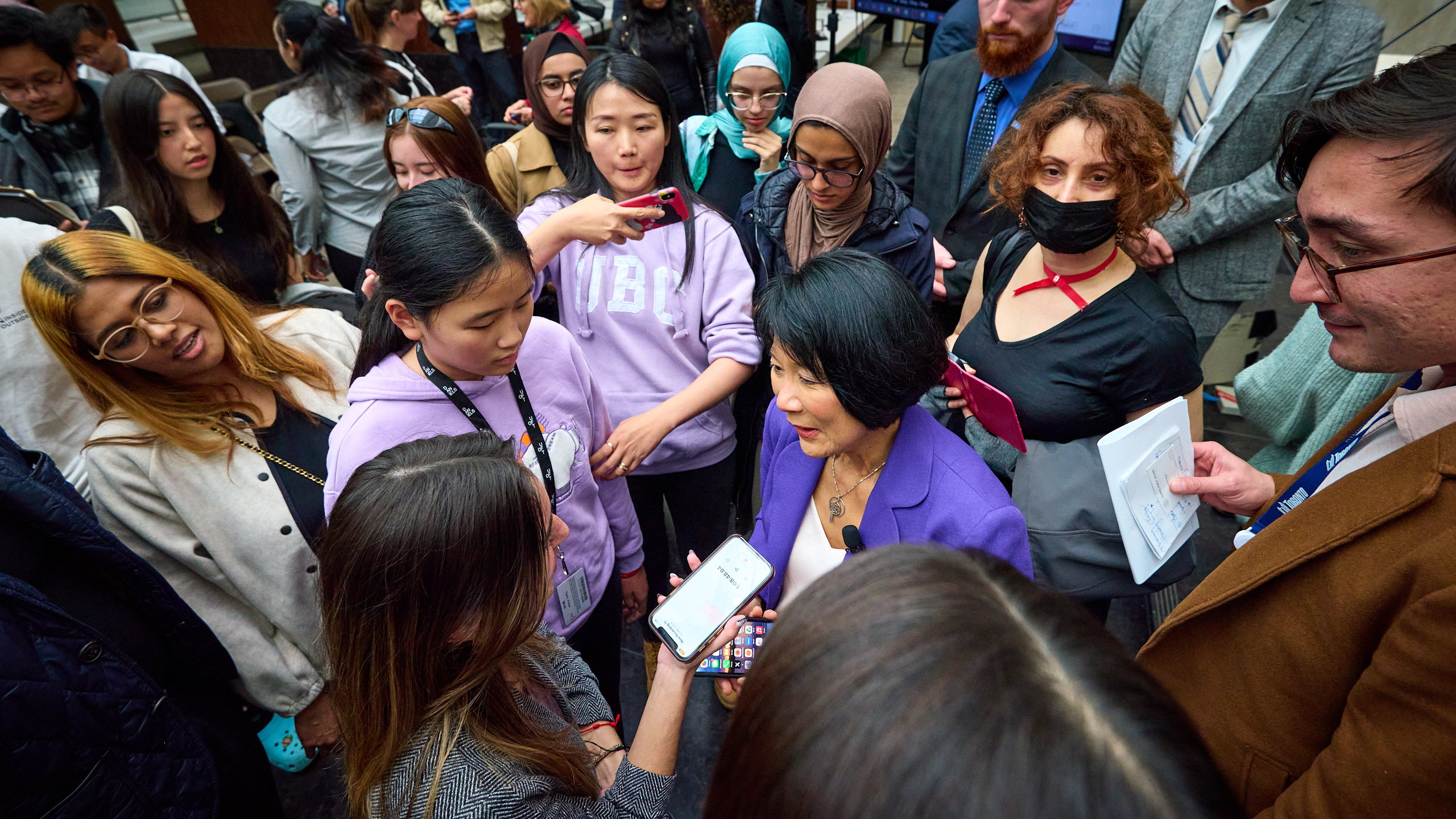
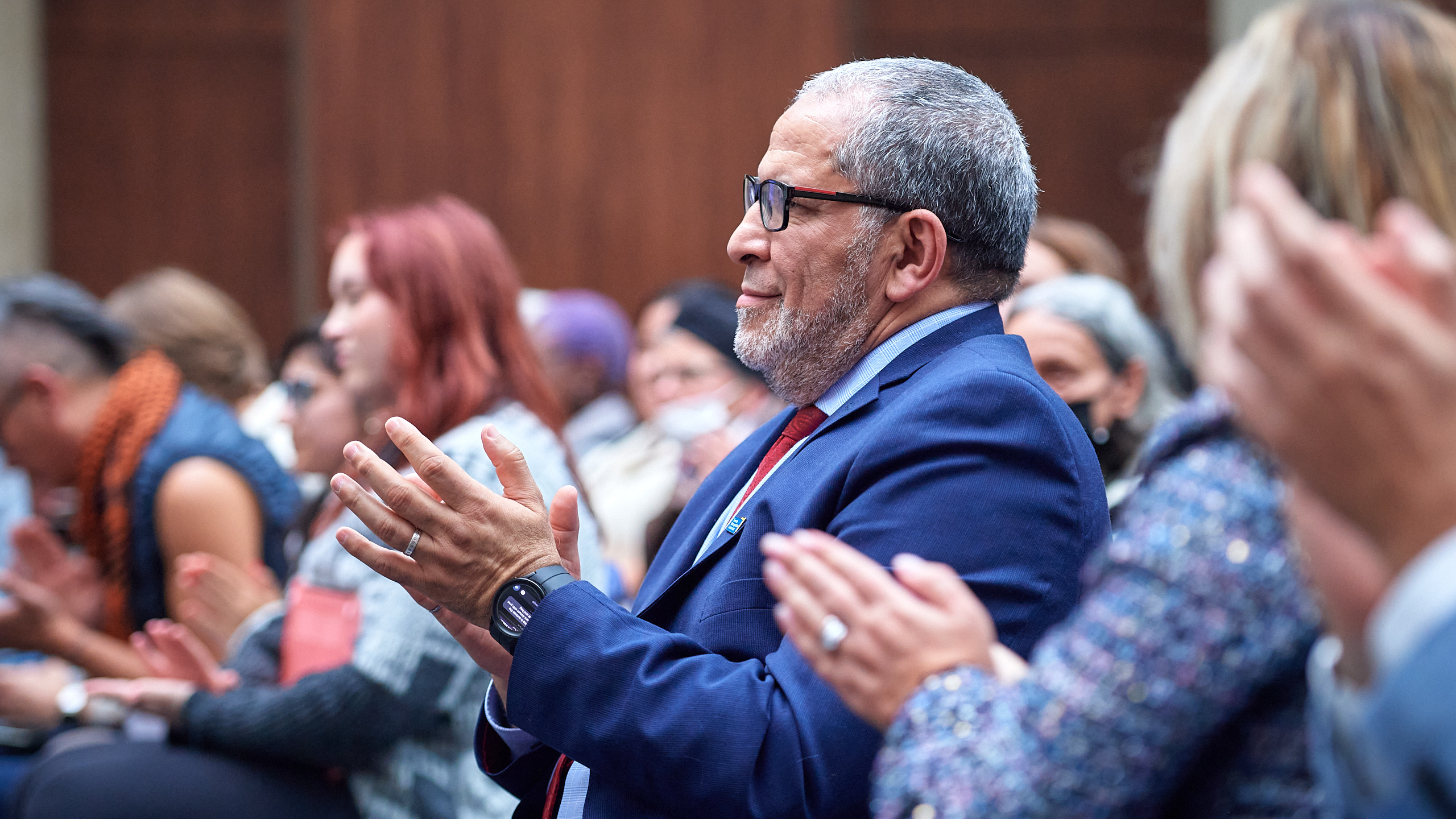
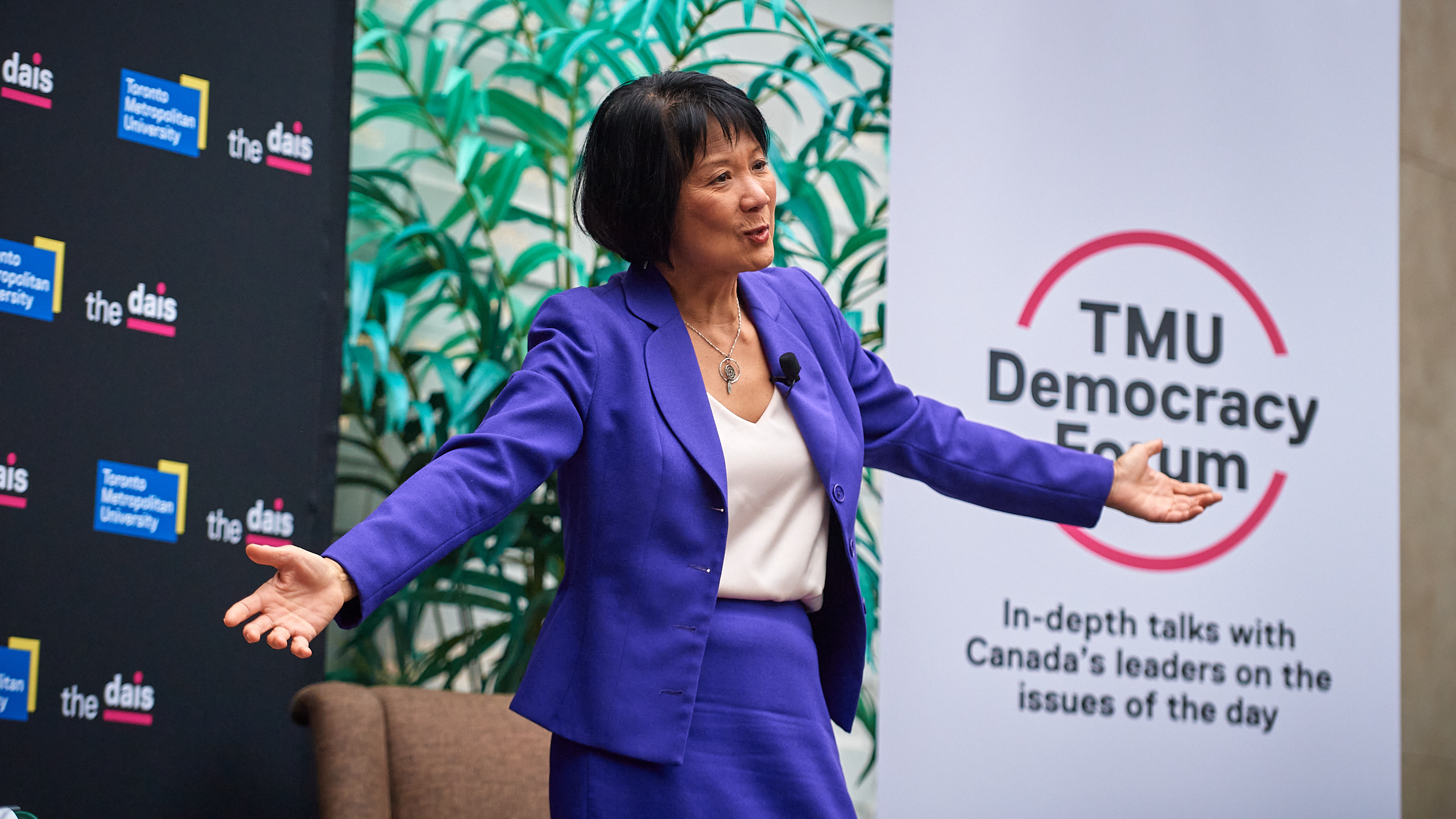
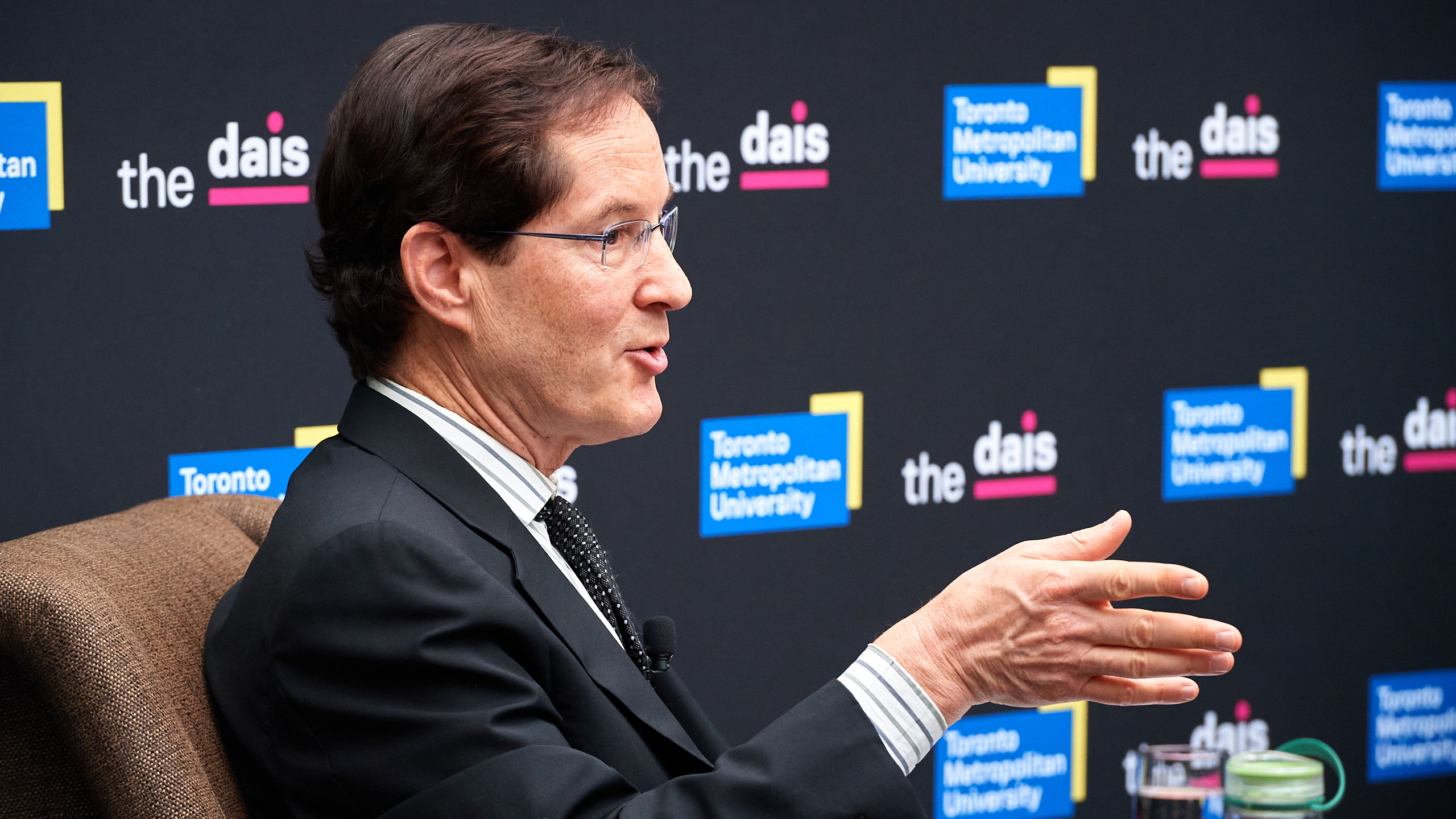
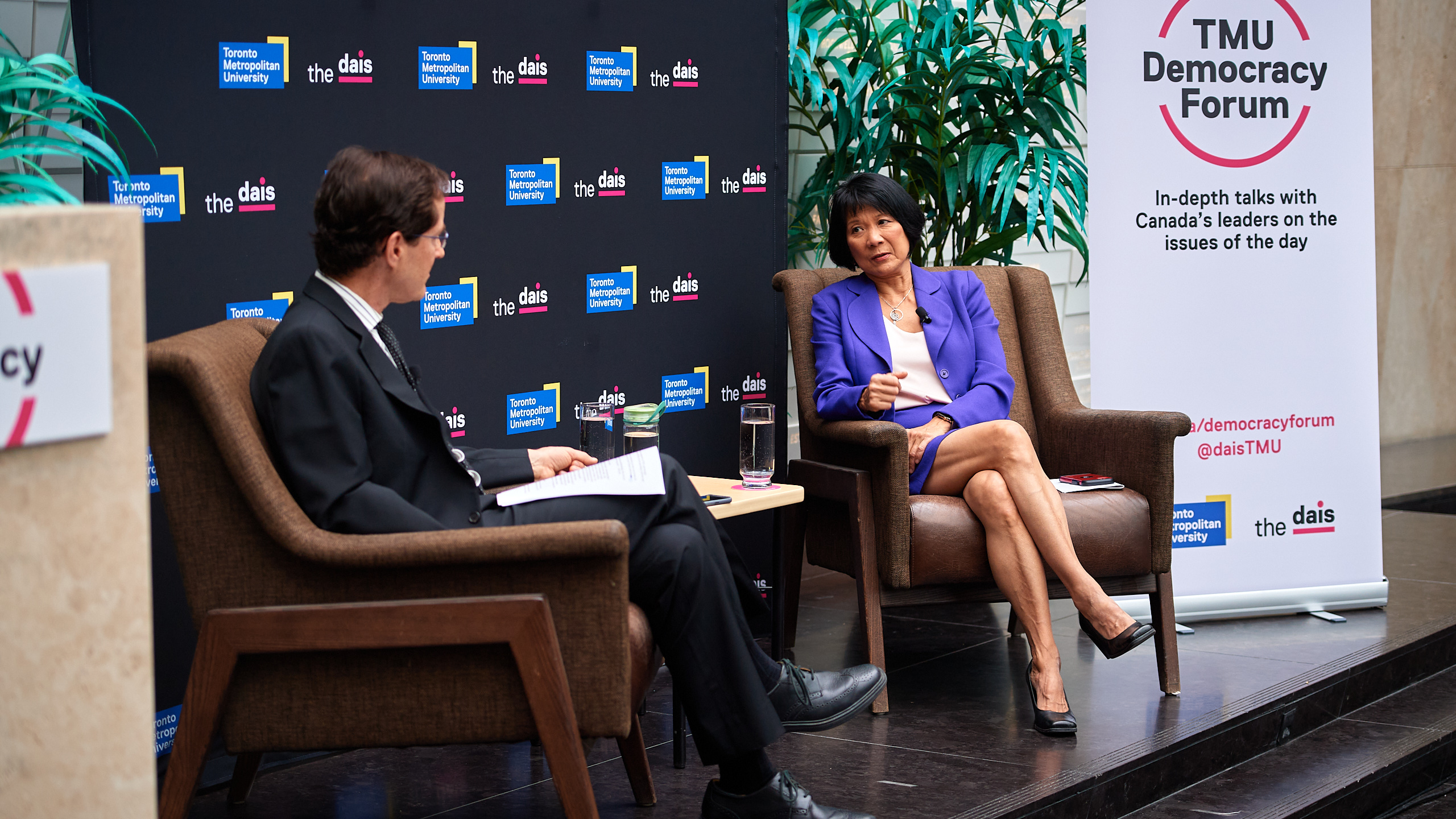
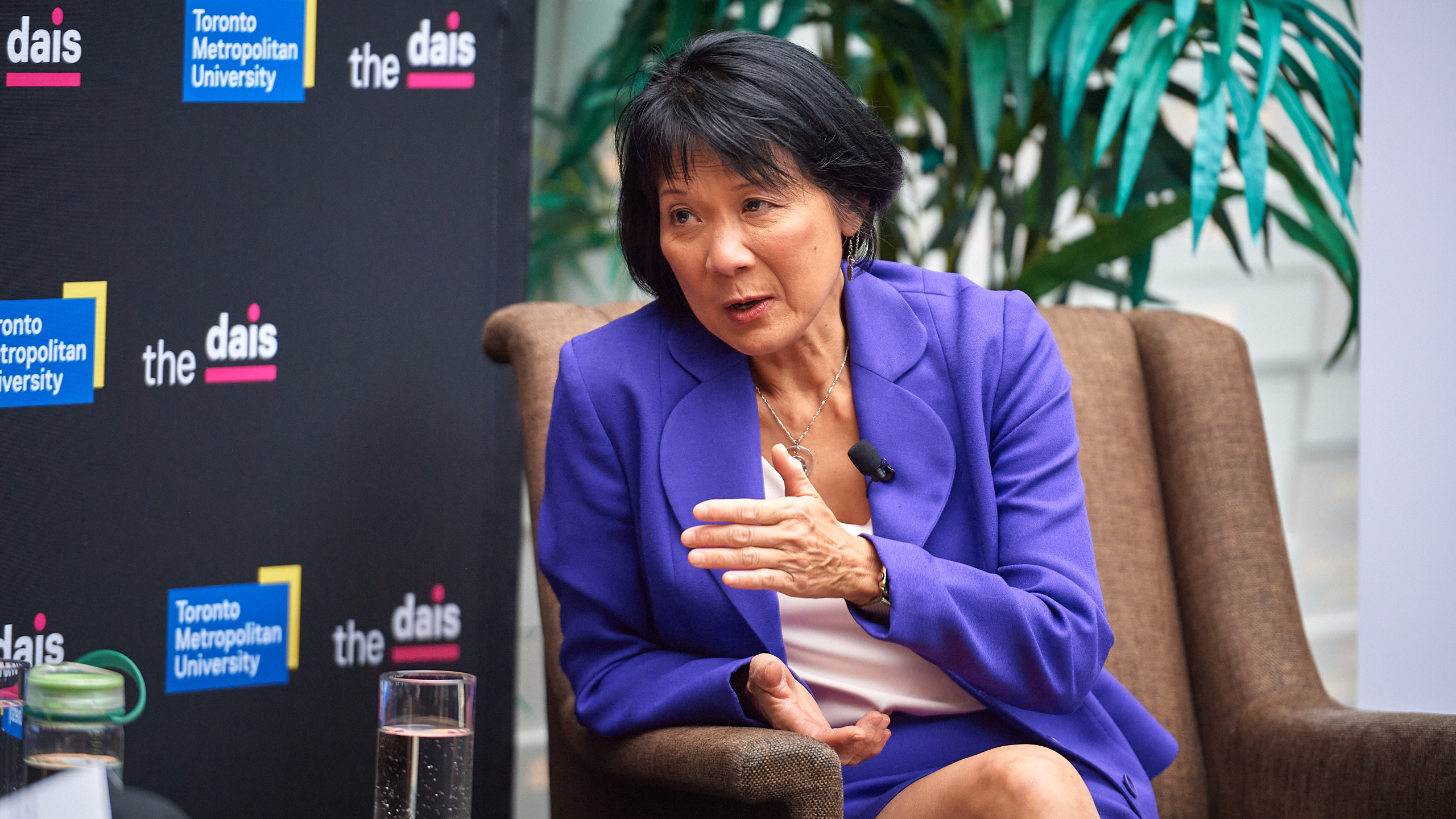
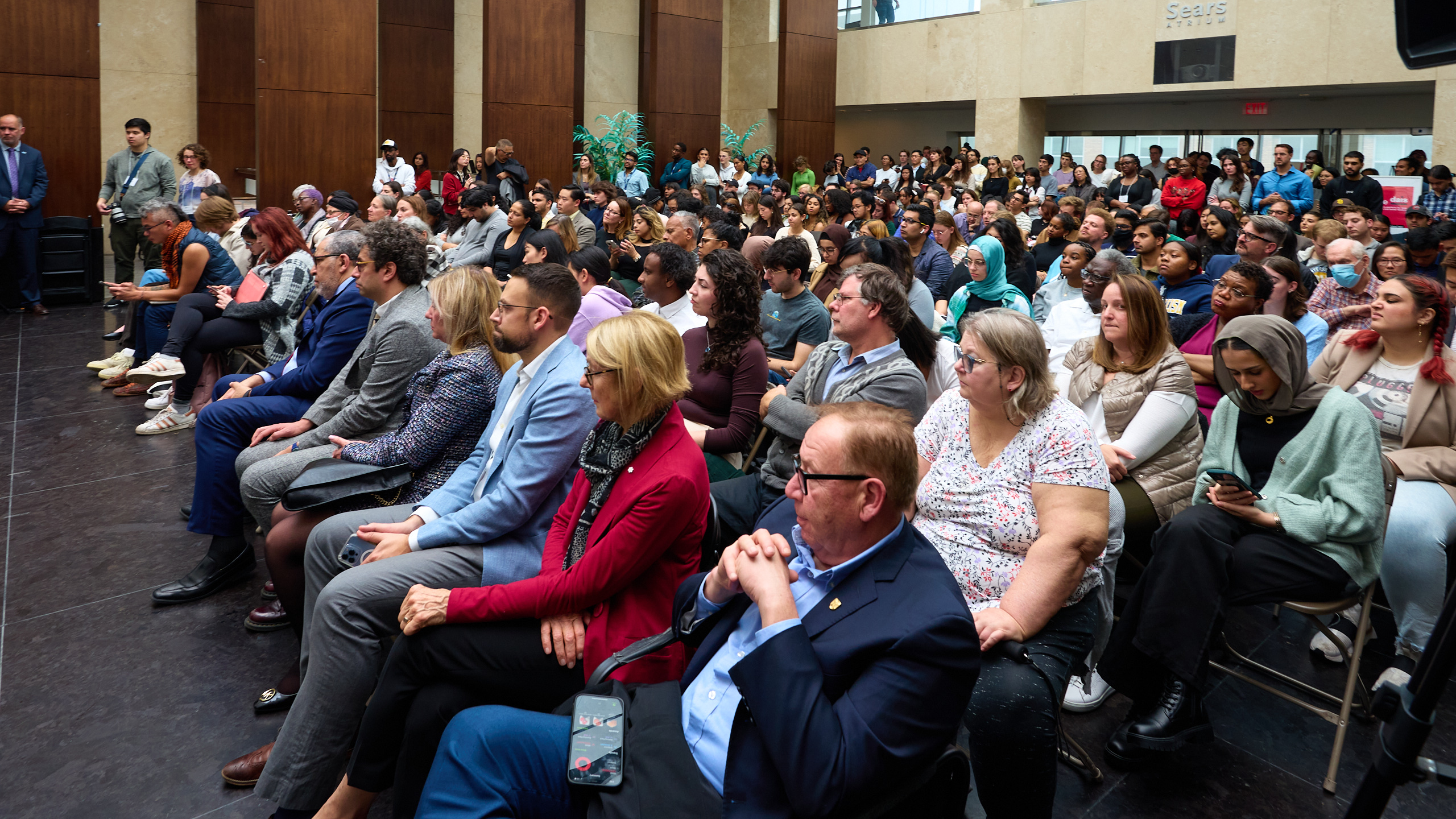
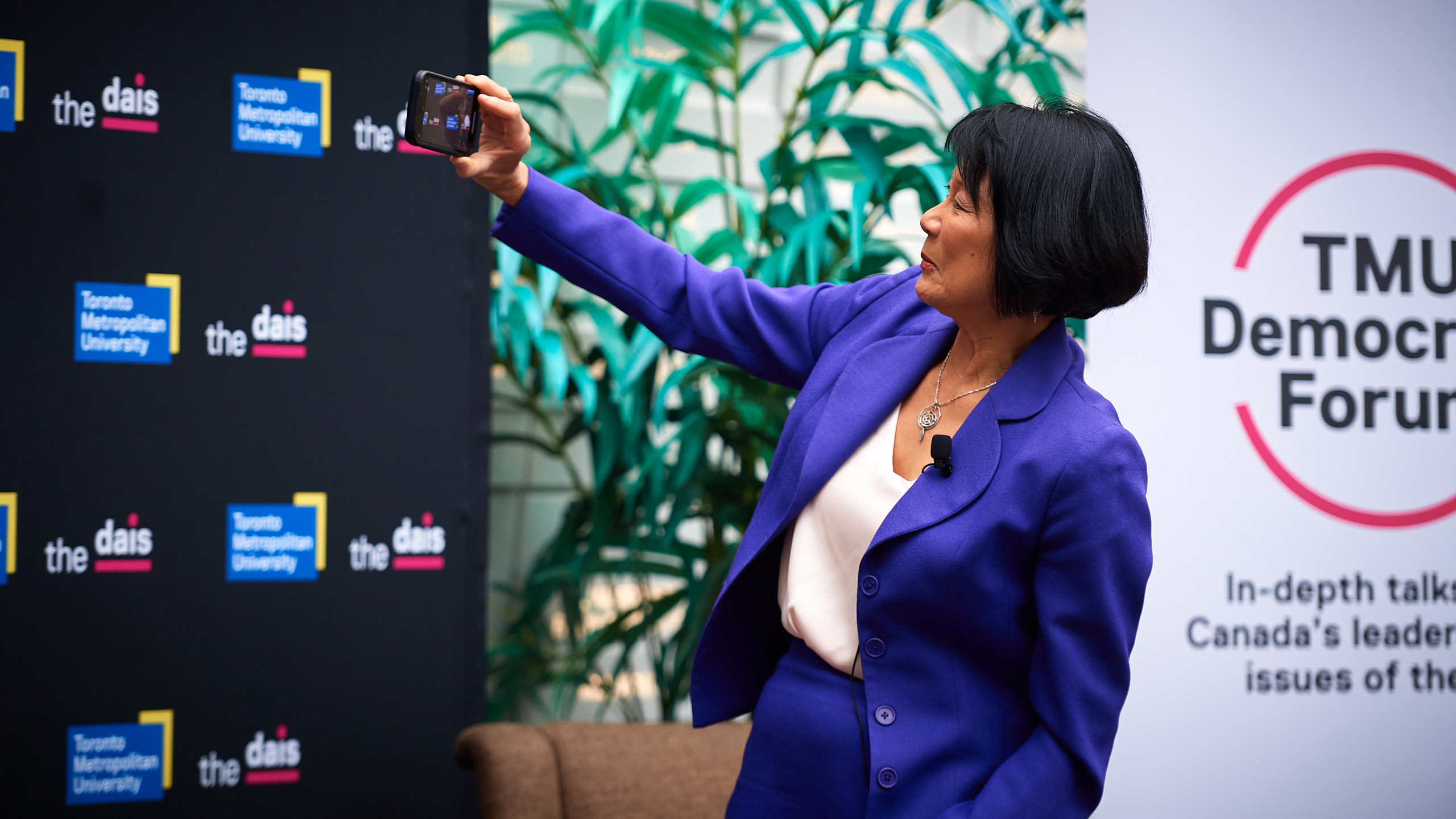








Leave a Reply